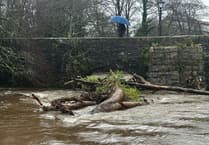THERE are just a couple of days left to the Wednesday, April 6, deadline to enter the Cornish Times competition for readers to win copies of a mystery novel set on the coast of Cornwall and which appeared in our March 25 edition.
Inspired by real events, The Lamplighters by Emma Stonex is an intoxicating and suspenseful mystery and an unforgettable story of love and grief that explores the way our fears blur the line between the real and the imagined. The book has just been published in paperback after first appearing in hardback to great acclaim.
The action all begins in Cornwall in 1972 when three light keepers vanish from a remote island lighthouse miles from the shore – yet the entrance door is locked from the inside, the clocks have stopped and the Principal Keeper’s weather log describes a mighty storm yet on the mainland the skies have been clear all week.
So what happened to those three men out on the tower – and can their secrets ever be recovered from the waves? These are questions the women they left behind keep asking themselves 20 years later as they still struggle to move on. Helen, Jenny and Michelle should be united by the tragedy but instead it has driven them apart. But then a writer approaches them, wanting to give them a chance to tell their side of the story – but it seems that only in confronting their darkest fears that the truth can begin to surface.
Cornish Times reporter Simon Artymiuk asked author Emma Stonex about her gripping story, which when it first appeared in hardback was praised by best-selling novelist Hilary Mantel as “The novel I’ve enjoyed most this year.”
The write-up on The Lamplighters says this mystery novel was inspired by real events – what were those real events and how did you first come across them?
I first came across the mysterious Flannan Isles vanishing more than ten years ago now, in a fortnightly publication called the Fortean Times. In December 1900, three lighthouse keepers disappeared without trace from a remote rock light in the Outer Hebrides. The men left a series of bizarre clues in their wake: a stopped clock, a locked door and a weather log describing a mighty storm, despite the skies at the time having been clear. Straightaway I was captivated by this event and knew I wanted to reimagine it in a novel.
You grew up in landlocked Northamptonshire – so how did your passion for the sea, and in particular your passion for lighthouses, develop?
My grandma used to live in Cowes on the Isle of Wight (my granddad was a merchant seaman, so my grandma was left on her own for much of the year – not quite the same as being a lighthouse-keeper’s wife, but not far off in that respect). We would always visit the Needles Lighthouse while we were there, which is a stunning monument at the end of a spine of chalky white cliffs. Holidays in Cornwall played a big part, too. I remember looking out at those lighthouses in wonder as a child – Longships, Godrevy – and walking up to the Lizard in fog. There is something very specific about the British sea and coastline that appeals to me. It’s the brininess, the nostalgia, the memories of crab nets and goosepimples. In The Lamplighters, I wanted to capture how the sea makes me feel.
When did you come to live in the South West – whereabouts in the region do you live and in what part of Cornwall is the lighthouse tower at the heart of The Lamplighters novel located? Is it a real one or an imagined, fictional one?
I lived in London for several years after university, then moved to the Chew Valley, just south of Bristol, to have a family. I love the South West. I love that I live at the gateway to Devon, Dorset and Cornwall, which are among my favourite places to visit. In The Lamplighters, I have created a fictional lighthouse, the Maiden Rock, but it is based on the Wolf Rock off Land’s End. The Wolf is my favourite sea tower. It was notorious among keepers back in the day for having an unsettling atmosphere, and its name originates from the howling sound the wind makes as it tunnels between the rocks. Such atmosphere, such history, such a great springboard for the setting of a mystery novel.
When did The Lamplighters first appear in hardback – and can you give examples of some of the 20-plus languages into which it has been translated?
The Lamplighters came out in hardback in March 2021. We were in COVID lockdown at that point, and I doubted I would see a copy in a shop: everything was online. Weeks later, when bookshops reopened, I was lucky enough to come down to Cornwall and visit the indies in Falmouth, St Ives and Padstow, see their magnificent window displays and thank them for their support. It was wonderful to see the book looking so happy in its homeland. It’s also ventured overseas, as you say, to countries as far-reaching as South Korea, Brazil, China and Sweden. The French edition is about to be released and I’m hoping to make it to Paris for the launch, and to visit a gorgeous Normandy lighthouse!
You have a background as a publishing editor – can you give us some examples of the publishing houses you have worked for, and when did you decide to turn to writing novels yourself?
I’ve always wanted to write books myself, but I imagined I’d try it later, once I’d first secured a ‘proper’ job! After university I applied for internships at every publisher in London and was delighted to secure a placement with Virago, the women’s literary imprint at what was then Time Warner Book Group, now Little, Brown Book Group. While there, I moved over to the commercial side and edited books by authors such as Jenny Colgan, Dorothy Koomson and Kate Furnivall. However, when I had an idea for a novel of my own, I knew I had to try and make it work. I wrote a manuscript in my evenings and weekends and showed it to a literary agent, who happily agreed to represent me. I spent the next eight years writing commercial fiction under different pseudonyms, before finally pursuing the project that had always been in my heart: the unexplained disappearance of three keepers from a remote Scottish lighthouse over a century ago.
Where did you get your inspiration for your novel’s characters from – the lighthouse keepers and the strong female characters at the heart of the story, for example? And do you find writing dialogue comes naturally to you?
It felt important to present as authentic a view of lighthouse-keeping as I could, and that meant researching these people’s lives carefully. It’s tempting to hear the world ‘lighthouse’ and think about bathroom trinkets and driftwood, or a kindly old seaman chewing his pipe, but the reality could be difficult and the impact on families severe.
I read every book I could find about lighthouses, from memoirs to manuals and everything in between, but my breakthrough text was a superb collection of interviews by the under-celebrated oral historian Tony Parker: his book Lighthouse (Eland, 2005) should be on every reading list, not just for people interested in lighthouses but for those interested in the workings of the human heart and mind. Combined with the first-person memoirs I had enjoyed, the book gave me a strong sense of voice.
I decided to tell the story in multiple first-person narratives so the reading experience would feel like the sea, always moving and changing, sweeping the reader in one direction and then the next. As to dialogue, keep it natural. Write dialogue people would speak, with all the inflections and repetitions that come with a real conversation. Listen to the words as you read them back, and if they don’t sound like an exchange you would overhear at a bus stop, write them again.
What has it felt like to have your novel praised by the likes of Hilary Mantel and by critics in the national press?
I nearly fell off my chair when I saw that Hilary Mantel had liked it! It’s very strange, to be honest. I worked so hard on this book for so long on my own – as all authors do – and so to see it set sail and connect with people is magical. The stuff of dreams.
What future writing projects do you have up your sleeve?
I’m currently at work on a new mystery novel, again inspired by a real-life incident, which is due for publication by Picador in 2023. It’s set in the Lake District this time, and has nothing to do with the sea…
To be in with a chance of winning one of our three paperback copies of Emma’s novel The Lamplighters, answer the question: On which real Cornish lighthouse is the novel’s Maiden Rock one based? and enter by Wednesday, April 6, using the coupon which appeared in our March 23 issue or by email using a photo of the completed coupon.





Comments
This article has no comments yet. Be the first to leave a comment.